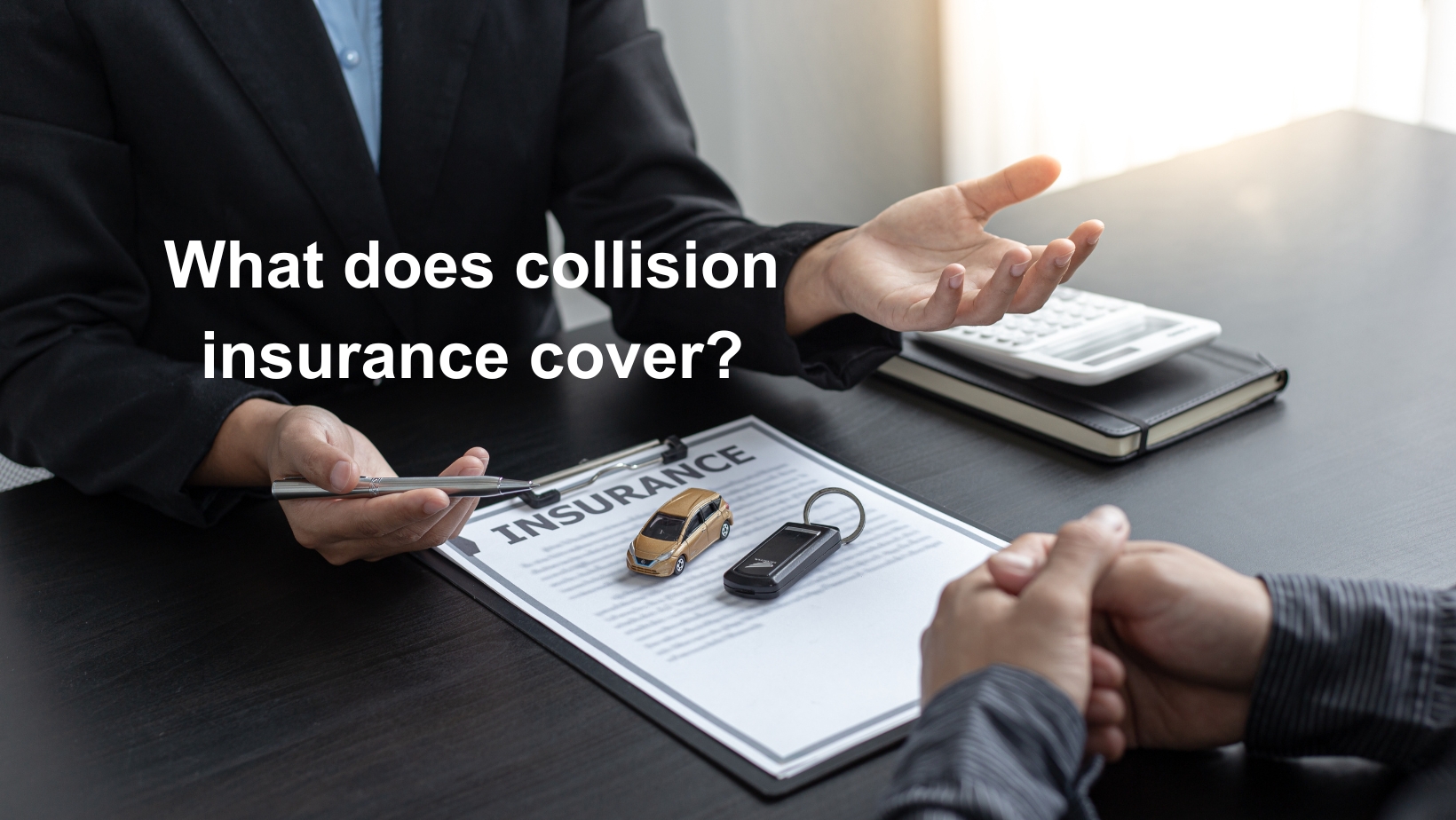Collision insurance is one of the first protection plans you’ll need if you want full coverage car insurance. But do you know how it works? Keep reading to find out.
We’ve put together a comprehensive guide to collision insurance for you. There you’ll find a comprehensive list of affordable collision insurance providers, as well as tips for finding the best car insurance for your needs. Plus, we’ll look at when you might need collision insurance. These include limits tailored to your car.

Contents
- 1 What is collision insurance?
- 2 What does collision insurance cover?
- 3 What does it not cover?
- 4 How is collision coverage different from comprehensive insurance?
- 5 Where can I find the best collision coverage for my car?
- 6 Frequently Asked Questions
- 7 Have you seen my sanity?
- 8 Psychological and emotional after-effects
- 9 Stress and anxiety after a car accident
- 10 PTSD after a car accident
- 11 Long-Term PTSD Effects of Car Accidents
- 12 How to overcome PTSD
- 13 How My Car Accident Gave Me a Case of Financial Jitters
What is collision insurance?
Collision coverage is an optional protection plan that insurance companies offer for an additional fee. It covers damage caused to your vehicle during a covered accident. Although you are not required by law to carry collision insurance, auto lenders frequently require it. It pays up to the actual cash value (ACV) of the vehicle. A collision protection package always includes a deductible.
What does collision insurance cover?
Collision insurance on an auto insurance policy covers damage to your car caused by a collision with another vehicle, an object, or an accident in which your vehicle rolls over. It doesn’t matter who is responsible for handling complaints. However, it does not cover collisions with animals, unlike full coverage car insurance. However, if you hit a tree or fence, your insurance company will cover the cost of the damage.
What does it not cover?
Although collision insurance often covers damage to your vehicle following an accident, it is not always applicable. Collision insurance generally excludes:
- Theft and vandalism
- Damage caused by fire, hail, floods and wind.
- Your car was damaged by a falling object
- Damage you cause to someone else’s car in an accident due to a collision with an animal
When purchasing car insurance, talk to your agent about full or comprehensive coverage car insurance policies to avoid paying out of pocket in these scenarios.
How is collision coverage different from comprehensive insurance?
Collision insurance generally covers accidents in which the insured vehicle collides with something like a tree, railing or another vehicle, causing damage to the covered vehicle.
Comprehensive coverage typically covers passive incidents such as extreme weather, collision with an animal, vandalism or theft causing damage to the insured vehicle.
Is this obligatory?
In many states, basic auto insurance coverage includes property damage. liability insurance, bodily injury liability insurance, and uninsured or underinsured motorist coverage. Some states may require drivers to carry bodily injury protection coverage. But no state requires collision insurance as part of a driver’s basic coverage.
However, just because your state doesn’t require collision insurance doesn’t mean you shouldn’t get it as part of your car insurance. You will be responsible for all vehicle repairs if you are involved in an accident and do not have collision coverage. Although minor body damage may only cost a few hundred dollars, repairs to critical systems, like the engine or suspension, can cost thousands of dollars.
Banks and other financial institutions require drivers to carry collision insurance. This is if your vehicle is damaged or totaled so they can recover the amount owed on your loan. If your vehicle is “totaled” in a collision and you don’t have collision insurance, you may be responsible out of pocket for the remaining loan payments.
In general, purchasing collision insurance is a good option because the possible benefits could well outweigh the expense.
Do you need it?
Adding collision insurance to your policy will increase your premiums. This will give you more protection and reduce your financial risk. If you own a leased or financed vehicle, your lender may require you to carry collision insurance.
Additionally, drivers of more expensive cars, or those that hold their value, typically purchase collision insurance to avoid paying out-of-pocket for major repairs. On the other hand, the owner of a significantly depreciated vehicle that would cost more to repair in the event of an accident may not view collision insurance as useful.
No one expects to be involved in an accident in which their vehicle is damaged or, even worse, destroyed. Losing your automobile can be emotionally draining as well as a financial strain you may not have anticipated. Collision coverage is available to protect drivers financially.
Where can I find the best collision coverage for my car?
All major insurers offer collision coverage as an optional add-on to your auto insurance policy. This is one of the basic coverages available, including liability, comprehensive medical coverages, bodily injury protection, and uninsured/underinsured motorist coverage.
Our team of analysts researched quotes from five different insurers. This is done to get collision coverage. We found that adding collision coverage to your policy could increase your monthly premium by $20 to $270.
We found the most affordable quotes from Progressive and State Farm among the top insurers , followed by Allstate. However, your car insurance quotes may vary because they are calculated based on several criteria. The best way to find the most affordable car insurance quotes for your needs is to shop around and get multiple quotes. online .
Frequently Asked Questions
What is a collision deductible and what deductibles are typically associated with collision coverage?
A collision deductible is the amount a car owner pays out of pocket before the insurance company starts covering it. This can range from $250 to $1,000, according to the Insurance Information Institute (III). A higher deductible can result in a significant reduction in premium, but it also increases the amount you will have to pay out of pocket in the event of a claim.
Does collision coverage cover rental cars?
Collision coverage normally only covers your vehicle, not the rental. However, most major credit cards offer collision damage waiver (CDW) coverage for rental cars as a benefit. You can also purchase additional CDW from the rental agency, which is often more expensive than using your credit card coverage.
How does collision coverage work if I am the at-fault driver in an accident?
Collision coverage generally applies regardless of who is at fault in an accident if the collision falls within the covered events. However, being the at-fault driver can increase insurance premiums after filing a claim.
Have you seen my sanity?
I’m not one for emotional outpourings (introvert, remember?), but this experience started a fire. I dove into the world of post-traumatic stress, devouring books like a bibliophile at a buffet. Turns out I wasn’t alone. Millions of people struggle with the silent consequences of accidents, their stories echoing mine.
I want to explore the emotional wreckage that car accidents leave behind, the invisible wounds that often go unnoticed. Remember that there is no speed limit on healing.
Psychological and emotional after-effects
After a car accident, you may have emotional and mental problems for the rest of your life. They can last long after physical injuries have healed and harm your life and future. Unfortunately, many people who have been in car accidents and insurance companies downplay the severity of the mental and emotional problems. After a car accident, the psychological effects can make your life less enjoyable and make it more difficult to do things like enjoy your hobbies, talk to friends and family, and even keep your job.
After a car accident, you may be more focused on your injuries. Many people in car accidents don’t pay enough attention to how the accident makes them feel emotionally and mentally.
Few people pay attention to car accident victims who are suffering emotionally or mentally due to the stress of the accident or the difficulty they have coping with their physical injuries. A qualified car accident attorney knows that these injuries can be just as serious as physical injuries.
Stress and anxiety after a car accident
A car accident can cause mental and emotional worry and trauma, making daily life more difficult for the person involved. Most people worry more about bruising. However, they should also worry about the consequences of the accident on their mental health. The turmoil an accident victim experiences is called emotional distress, even if they have no medical explanation for their feelings.
When people are emotionally upset after a car accident, they may experience several signs, such as
- Thoughts of mental pain
- Stress and worry
- Mood changes
- Tantrums
- Be scared
- Feeling embarrassed
- I try to cry
- Sleep problems and bad dreams
- Not wanting to eat
- Not being interested in normal things.
These types of mental disorders can ruin a person’s life and make it difficult for them to do things like go to work, school, or even get out of bed in the morning. Some people may not want to get in the car because they fear another accident. This may prevent them from attending treatment meetings and other important events. In some situations, emotional pain can go away quite quickly. However, the feelings and daily interruptions can last a long time, especially if the person still remembers their hurts.
PTSD after a car accident
The emotional trauma caused by a car accident is a major problem that makes it very difficult for the victim to go about their daily lives. Some people who have been in a car accident may be labeled as having a mental illness that was made worse by the accident. Once a person is in a car accident, post-traumatic stress disorder (PTSD) is the most common mental illness they suffer from.
PTSD is most commonly seen in soldiers who have just returned from war, but it can occur after any traumatic event. People injured in very violent car accidents can be traumatized and develop PTSD. Studies have shown that about 9% of people who survive a car accident later develop post-traumatic stress disorder. Many people with PTSD also have an intense fear of driving or another anxiety disorder related to driving.
People with PTSD may experience many mental changes over the course of their lives. Here are some signs of PTSD:
- Strong, recurring thoughts about the accident that you can’t stop having.
- Sometimes there are periods of “blackout” during flashbacks.
- Terrible dreams.
- Please avoid things that might remind them of the accident, such as driving, driving a car, or even being near a car.
- Extreme mental or physical pain after seeing or hearing a reminder.
- Depression and staying away from people.
- To harm one’s self.
Injured people often need regular therapy over a long period of time to deal with PTSD. Additionally, they may need medication and other help to return to normal life. For people with mental illness, this type of treatment can be just as expensive, if not more so, than treatment for bodily injuries.

Long-Term PTSD Effects of Car Accidents
People who are victims of accidents that do not kill others may suffer from major mental stress, such as PTSD, anxiety, depression and phobias. However, this raises the question of what the long-term concerns are.
A study at the BMJ found that a third of child victims of serious accidents experience mental trauma and the effects can last up to a year after the accident. Another study found that the results were almost the same in adults, which does not directly apply to them.
The American Journal of Psychiatry published this study, which found that “different frequencies and courses of PTSD, phobic travel anxiety, general anxiety and depression were reported by a third of subjects during ‘follow-up at three months and one year’. Some accident victims said their condition improved over time, while others said they began having mental health problems long after the accident. Many people who reported having persistent symptoms were not drivers but guests in the car.
How to overcome PTSD
People who are afraid of driving have difficulty getting to work, picking up their children, or doing other daily tasks that most people don’t hesitate to do. Some people may feel anxious when driving near the scene of the accident, in similar conditions (such as bad weather), or when something reminds them of the accident.
These effects of a car accident can be surprising and make it difficult to function, but there are things you can do to alleviate some of them. After a car accident, here are some steps you can take to begin to overcome the mental effects of the accident:
- Tell your family, friends, and doctor how you feel: These problems can be treated well, so people should not be afraid to suffer from them because they might be judged. Your loved ones can also help you. They know your personality and how you feel because they’ve been through the same thing.
- Try to keep track of your daily tasks and life: Feelings of sadness and worry can quickly take over your life. Still, trying to stay busy with exercise, daily tasks, etc. can make a big difference. This is something your family doctor can help you find out.
- Talk to your family doctor again: They can help you find other health care professionals, mental health professionals, or therapists who can help you manage your worries. They can monitor your recovery and give you any medications you may need.
- Try to return to your normal daily routines and activities. Some people need to limit their activities after a car accident. It’s important to try to do the things you usually do. This is part of healing, even if at first it makes you feel bad or scared. Don’t stay indoors because you’re afraid of what might happen if you drive or leave the house.
- Be a safe driver: Driving or getting into a car can be difficult after an accident. Learning defensive driving can reduce your chances of getting into an accident or injuring someone else.
How My Car Accident Gave Me a Case of Financial Jitters
Car accidents can leave you with PTSD. Car insurance rates will give you flashbacks to your college ramen budget.
Remember when I compared my car accident to a clown car fire drill? Yeah, good times. Turns out the emotional ruins weren’t the only thing left behind. My bank account looked like a post-apocalyptic wasteland.
Here’s the positive side of my screaming metal nightmare: Way . No, not the creepy neighbor who whispers about the government, but the car insurance comparison app that saved me $971 a year.
That’s right! Enough to finance a therapist specializing in panic attacks caused by car horns (yes, those exist). So while I’m still haunted by flashbacks of crumpled wings, at least my wallet isn’t screaming in terror.
Moral of the story? Don’t let a car accident turn into a financial crisis. Head over to Way, compare prices, and get your sanity back (and maybe some spending money for therapy llamas).






